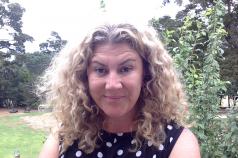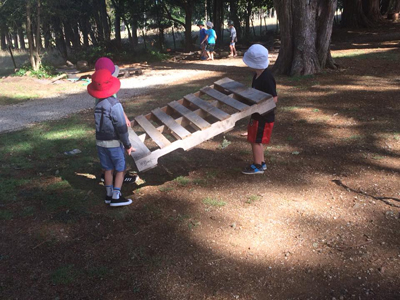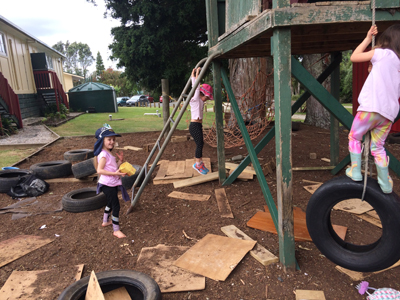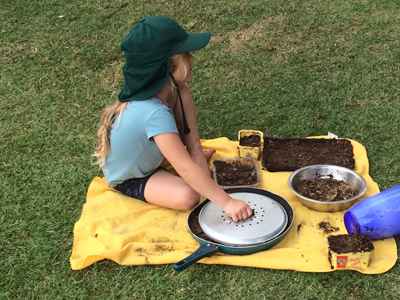Leslee Allen, principal of Kaurihohore School, is an advocate and practitioner of play-based learning. In this blog, Leslee responds to three common misunderstandings about play.
This is the third blog in a three part series about learning through play.
Play-based learning and the NZC
Learning through play can help schools realise the vision of The New Zealand Curriculum and support students to develop values, key competencies, and understandings across all learning areas.
Learning through play also provides the opportunity to extend the use of our Te Whāriki curriculum into primary schooling. Te Whāriki encourages primary teachers to weave the principles and strands of the early childhood curriculum with the values, key competencies, and learning areas of The New Zealand Curriculum as children engage in learning experiences. This will enable our young learners to experience joined-up transitions between settings.
I regularly come across online discussions about play-based learning that are echoes of the old me, the discussions are robust and the opinions are based on personal viewpoints and some research into learning. What has dismayed me is that there seems to be a very real misunderstanding around what it means to be operating a play-based or developmentally appropriate environment. Play and the simple nature of this powerful practice is being viewed as if it is frivolous and inconvenient once children are at primary school.
I want to spend some time talking to the misunderstandings I have read, as they were also misunderstandings that I probably would have expressed six or seven years ago. I also acknowledge that quite ironically the teacher I was prior to 2015 would have stood on the other side of the argument I am about to present. Something I am always very open and honest about.
I hope that in sharing the journey I have had, I can help others see the powerful role that play and developmentally appropriate teaching has in our profession and why I hope that others choose to take the journey with me. If someone like me, who had been teaching for 17 years, can completely transform her pedagogy based on research and personal inquiry, surely there must be something in it.
Was I wrong before? No! A lot of what I was doing then was quality stuff, our children did very well, we were having fun, we were having great success with Mantle of the Expert. There was no real reason academically for me to make the change to how I did things.
That is because the reason was not academic. It was developmental, social, and emotional, and the transformation has been ground breaking for me and absolutely transformational for my classroom.
Misunderstanding one
If we let them play, if we give them time, if we "waste" those first two or three years on developmental goals related to brain development and we don't formally teach them to read and write, children with learning needs will not be picked up until too late, they will then trail through their schooling experience always behind and never helped. The system will let them down.
Wow, reading this one the other day blew my mind, because it could have been me speaking years ago. Old me was in a race to pick up children that needed intervention, I had all my data in a row, highlighted and double checked. If a child didn't have all their 30 words after six months this was really worrying to me. I would leap in and give them teacher aide time. Hmmm...did this really help? Maybe in a limited way, but it wasn't the help they really needed. In fact, it was probably more likely that it was me that needed the help.
Firstly let me say that it is much easier to pick up children and their needs in a quality environment based on play and developmentally appropriate approaches. In fact because we are using developmental approaches that are based on how the learning brain actually develops, we are in fact ensuring some classic difficulties like mixed dominance and processing issues do not even occur at all. We are also establishing strong relationships and working with the knowledge that this is the most important thing we can do, eliminating deficit thinking and working from a place of competence.
We know each child so well in our environment, we know them on an individual level and we can provide for them as such. These children are all on their own individual path, we can monitor them in these first few years and ensure that developmentally they are making progress. If not, we can provide support that actually helps, and is not based on memorisation, but is based on how the brain actually learns.
My point is this. If the environment is ticking along right, if developmentally appropriate practices are being used so that each child is progressing right where they need to be, and if everyone in the first few years is on the same page, children will not be lost through the cracks, they will be supported through quality practice and time. In this environment the word acceleration is not one we use, it is far more important to slow down and build strong foundations from which they can grow from.
Children only fall through the cracks if the system you have in your school allows them to do so, and sets targets for learning that are not even appropriate for where their brain development is up to. The truly beautiful thing is I am not just talking about academics here. I am talking about social and emotional needs and how children see themselves as learners. To me, those areas are more important to begin with anyway and exactly what we need to be focusing on if children are going to be successful in an unknown future.
Our children are well supported in their journey, right up to year 6. Just because we love and embrace play, does not mean we are not accountable for their progress. To think so, or imply so, would be incredibly insulting.
Misunderstanding two
If we do not deliberately teach them to read and write as soon as they walk through the door we are letting them down. Developmental readiness has nothing to do with it. If they are not taught to read and write straight away we are putting them behind and holding them back.
Yes several years ago, I may have agreed with this misunderstanding. We would leap straight into reading, because that is how children learn to read isn't it? We would drill the phonics, we would teach each sound, we would brainstorm words with common sounds, listen to sounds, have fun with sounds...brilliant! Our classroom was print rich, the teaching of literacy was my thing, it was something I was really good at.
But as a result we had many reluctant readers. Of course this was the child's fault wasn't it? They were the ones that were reluctant. They didn't want to learn to read so we just kept plugging away. The very definition of madness.
What we did not realise was that it was us putting the barriers up. We were shoving down their throat learning that they were not ready for developmentally, they were not interested in, or the least bit curious about, they couldn't see the point, their interests were elsewhere. Generally that elsewhere was outside, jumping, kicking, rolling, balancing, climbing – exactly what their brain needed them to be doing.
Yes we can teach children that are not ready. There are many children in classrooms all around New Zealand that are learning to read quite well, they will get to dark blue, green, maybe even orange and then there may be a stall noticed. Others will catch up and are likely to pass them, those that have progressed as they have needed to developmentally are now curious, engaged and driven to learn, right where they need to be. Children who are allowed to see learning as authentic and purposeful will be lifelong learners, is this not what our curriculum sets a mandate for?
We can force early learning on children, and we do, and they will learn in many cases, but should we?
There is a huge collection of information out there that tells us that early progress is no indicator of later greatness. In fact in my experience it is those children that progress slowly in the first few years that go on to do best. I have many years of practical experiences observing just this fact, over and over again. It is those that make slow and steady progress in their first three years that go on to be our most independent, resilient, engaged, and motivated learners.
You will of course always be able to find research to suit your own position but let me say this, an environment that takes into account first and foremost where a child is at developmentally, is not going to miss seeing any learning difficulties just because they do not engage with early reading. In fact I would say that we are much more likely now to pick them up. I feel that now by doing less, I am getting much, much more. I am aware of each child’s interests, urges, strengths, their uniqueness. Children are the curriculum and our learning is rich and purposeful.
In answer to the misunderstanding. Children in a quality play-based environment are not being held back with their literacy development.
- They are in vocab rich environments – they hear and engage in rich discussion, which they take a full part in
- They explore and talk and learn at their own pace
- They feel safe and happy, not anxious about not being able to learn
- They revisit learning as many times as they need to
- They imagine, create, and innovate
- They are exposed to wonderful print
- They see reading, maths, and writing in beautifully authentic contexts
- They drive their own learning
... and yes, we engage with them at their point of developmental readiness.
We lay a solid ground, to support development of a beautifully happy brain that when it is ready, will devour reading and writing and everything else in its path, because this is what it is built to do....learn!
I welcome anyone to come in and just listen to our discussions, to the elevation of language, the awareness of vocab, the depth of questioning and noticing, you may be pleasantly surprised.
We are not holding them back, we are not putting up barriers, we are breaking them down, children learn more in my play-based environment than they ever did in my traditional room. Are some children learning to read and write already, are we "teaching them?"....yes of course, because they are ready to be doing this, they are doing well and making good progress, and many are not up to this yet, and that is OK.
Misunderstanding three
All they do is play wildly, it is noisy, unruly, and it is lazy teaching. This environment belongs in ECE.
This is a pretty common misunderstanding and so far off base.
However I understand it, because it is something I would have uttered before I realised. I have actually come to realise that I have a huge amount to learn from my colleagues in ECE, they know so much more than I do still. They actually understand the learning process a whole heap better than I ever did. Te Whāriki is a quality document and one we should be using right up to year 3. It is a document focused on growing the individual and truly captures childhood.
Now don't get me wrong, some of the play in our class is pretty wild, we have cowgirls, cowboys, witches, fairies, masked crusaders, and other weird and wonderful characters flying around, interacting, or not, with each other.
We also have builders, artists, scientists, investigators, readers, writers, shop keepers, teachers, fishing experts, hut creators, adventurers and a range of other busy characters, who spread out in their inside and outside environment and are thoroughly invested in their play.
Rather than being lazy, I have never been so busy, from beautiful moments of observing the play, to those special moments of engagement and working alongside without directing, to the times when I spend time working with children individually on their personal developmental goal, or one that may be now more focused on traditional academic learning. I am observing interests and urges, planning on the go, truly seeing the curriculum evolve right in front of me and generating ways I can build and expand on this for those that want to.
I am taking photos for later, making notes in my head for class learning stories and Seesaw so that parents can get a view into our day, busy noticing the dispositions being displayed so that we can use them when we reflect on our play as a class. I am observing social and emotional needs and formulating quick sessions that will be great 'just in time learning.'
We spend time together learning, we learn in groups, we learn individually, learning is shaped around the needs of the children, not the needs of the teacher to get things done.
I believe we all have a lot to learn from the levels of learning that would have previously been seen as below us. New entrant teachers, need to understand brain development, and what early learning looks like. So do teachers working at higher levels of the school. Rather than saying that should be taught before, we need to accept that we need to understand that a child will come to us, wherever they are developmentally up to, and it is our job to know how to provide for them best.
We have developed a very simplistic question at our place, but it is helping the other teachers in the junior school really see social, emotional, and developmental progress for what it is.They ask us "how old was the child when they came in?" What they mean here, is roughly what would be the developmental age. This is not a slight on the child, but a very basic means of insight. If we reply "2 or 3" then they know that if that child is now presenting as they would expect to see a five year old in year 2 or even 3, that they have indeed made progress. It just doesn't look like it used to and that is ok.
These are the three dominant misunderstandings around play that I have experienced over the last few years on this journey, and read about many times when I am brave enough to read the comments of others.
If you are considering embarking on a play-based environment, please take time to ensure you understand the why and how, take time to read about the brain and how it develops. Take it slowly and get it right, so that we can keep clearing up these little misunderstandings and assumptions about learning for the good of our children and for the good of our future.
We need children who will grow up to be kind, independent, creative, resilient, motivated problem solvers with initiative. Why then would we force them into a daily routine of structure and learning defined by us? It’s time to turn our system on its head before it’s too late. The best thing is this, our curriculum gives us permission to do so and always has.
Have you seen ...
Number Agents blog
Leslee Allen regularly writes about play-based learning through her Number Agents blog.
Learning through play – What’s it all about?
This NZC Online blog explores what learning through play is all about and shares how some schools are designing a play-based curriculum. It is the first of a three part series.
Beginning a journey into play
In this blog, Leslee shares key considerations for teachers who are interested in beginning a journey into play.





